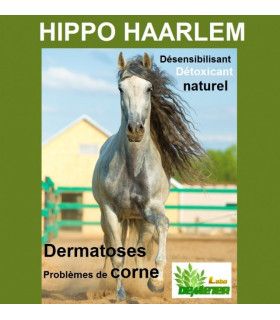How to treat digestive disorders in the horse in a natural way?
Monogastric herbivorous animal, the horse, when in the meadow, spends an average of nineteen hours a day eating very small meals while walking in order to compensate for its digestive insufficiency. The latter, which is due to the specificity of its digestive system, makes the horse very fragile in this respect. Their diet must therefore be ideally suited to their age, environment and activity so as not to unbalance their intestinal flora. If her health has deteriorated, natural solutions can supplement veterinary treatment to soothe her pain, but these remedies can also be effective as a preventive measure.
Horse digestion
The horse has a digestive tract of almost 130 meters. The small size of its stomach (15 to 18 liters) represents only 7% of its total volume.
His small intestine, also quite small, accounts for 30%. Since food only stays there for a short time, it is in this area that fat changes to glycerol and fatty acids, protein to amino acids and starch to glucose. Vitamins and minerals are absorbed (except phosphorus). Thus formed, these nutrients provide energy to the horse. This is the reason why it is essential that its digestion at this level is optimal (especially if it is a sport horse).
Representing 60% of the total volume of its digestive tract, the horse's large intestine is composed as follows:
- The ascending colon
- The descending colon
- Rectum
- The cecum
It is this part, added to the intestinal flora, that makes microbial fermentation possible so that it can digest the large amount of fiber in its diet. Participating in the immune defense of its body, the intestinal flora weakens with age and each change of diet puts it to the test (competition weekends, changes of stable, season, stress, taking certain dewormers or antibiotic treatments, etc.). A deficient intestinal flora can therefore severely alter the state of health of the horse and be the source of many problems.
The different digestive problems of the horse
Many horse owners have already faced the inconvenience of digestive problems in their animal. These include colic (domestication is the primary factor), ulcers and a collapse of the immune system.
Symptoms can vary from horse to horse, but the most common of them are:
- Bloated stomach
- Constipation
- Dry and smaller dung
- Diarrhea
- Abdominal pain related to transit problems
Gastric ulcers are noticeable with the appearance of the following symptoms:
- Signs of colic
- Repeated yawning
- Dysphagia
- Weight loss of the animal
- Intense fatigue
(If the animal exhibits any of these symptoms, the veterinarian should be contacted to prescribe a treatment for the horse that will lower the acidity in its stomach.)
To prevent these complications, effective natural solutions provide optimal digestive comfort to the horse.
Natural solutions that help the horse to digest better
Herbal medicine, represented by the natural solutions present on the market, allows among other things an optimal digestive comfort in the horse and its benefits are convincing. Having the advantage of being safe for the animal, these solutions are used as food supplements to relieve the ailments to which it could be victim or to supplement veterinary treatment.
Among the natural remedies capable of treating digestive disorders in horses, Labo Demeter offers Hippo Haarlem. Very popular with equines for its vanilla scent, this palatable powder which contains probiotic flora in particular is a cleanser that does not contain any doping substance. Indicated in the problems of digestive disorders of food origin (very rich or unbalanced diet, sand, intestinal fermentation, etc.), its composition helps bring digestive comfort and well-being to the horse, including as a maintenance treatment.
Its composition which combines sulfur, magnesium, organic silicon and probiotic flora helps regulate the immune system, harmonize the intestinal flora, neutralize the production of toxins and improve the absorption of essential nutrients.




